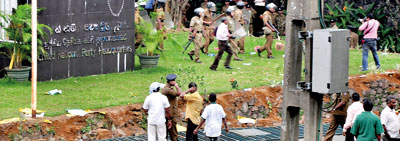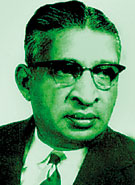Many, many years ago, when the SLFP was in the throes of a power struggle, a columnist of the day used the old Swahili proverb above to describe the strife.
Variations of this saying are found in other African languages, but the meaning is basically the same- when the big ones are at war, it is the small things around that are damaged or destroyed.
This proverb should have been more appropriately used in relation to the UNP, since the elephant is the party symbol, as Junius Richard Jayewardene reminded me decades ago, when confronted with a similar situation.
The recent incident, if you'll pardon an understatement, at the UNP headquarters, reminded me of a story that JR, as he was popularly called, like many Sri Lankan politicians known by their initials or first name, told me after a really bitter leadership struggle within the UNP.
 |
| UNP headquarters boundary fence lies flattened as riot police chase protesters in the UNP compound |
Sirikotha, the HQ of the UNP, always seemed to be the battleground. Last month's fracas at the current Sirikotha seemed like a throw back to the stone age. The missiles used in this clash were stones, to judge by one that UNP leader Ranil Wickremesinghe displayed after the electoral bruising of his opponent.
His posture with stone in hand, reminded me of comedian Groucho Marx in one of those hilarious Marx Brothers movies that regaled us in days gone by. After a stone crashed through his office window and landed on the table, Groucho made a classic observation.
"Whoever threw that stone," he said, mustering his acutest investigative powers, "must be a stone's throw from here."
Going by Groucho's deductive powers, those looking for the culprit or culprits who hurled one or more stones would not have to look far. Unless, of course, modern technology had been resorted to and rocket-propelled stones are part of the latest ordnance in political warfare.
Talking of warfare brings me really to what I wanted to recall. It goes back some 40 years, and my memory is somewhat hazy of all the details. But the 'story' that JR told me four decades ago, in that old Parliament by the sea, remains as clear and vivid as though it was only yesterday.
Mrs Sirima Bandaranaike's SLFP, with the LSSP and CP in harness, had won the 1970 general election decisively. The UNP, which had been in power for five years- perhaps the first party until then to serve the full term- had been reduced to a paltry 17 seats.
With the party in some sort of disarray after the electoral defeat, differences within the UNP became even more prominent, with party leader Dudley Senanayake's stewardship subject to criticism, albeit more subtly at the beginning, than the open bickering that characterised more recent disputes.
The chief challenger demanding change was a very senior member of the party, Junius Richard Jayewardene.
If I remember correctly- and I am somewhat hazy here- it had to do with the party's executive committee, which was an all-powerful body that appeared to be under the control of Dudley, if I may call him that.
It is all so long ago, that I cannot remember now whether the matter did end up in the courts, as some issues came under legal challenge. JR and his sidekicks were determined to dilute the powers of the Ex-co and so minimise Dudley's hold on the party.
This would allow JRJ to launch a real challenge.
At this time or immediately after, I was Parliamentary Editor of the Daily News. Certainly,
I was the paper's Lobby Correspondent, which is really a misnomer, concocted by somebody who had misunderstood the functioning of the parliamentary correspondents' lobby system in the House of Commons. Anyway, I was writing what was really a daily sketch of parliamentary proceedings, trying to capture the essence of the day's sessions for a front-page column.
One day, as I entered the Members' restaurant, which, unlike today, was not isolated, and which, journalists strolled into, hoping to pick up news and a cup of tea from some indulgent minister or MP, I spotted JR seated alone having an early tea break.
 |
 |
| Dudley Senanayake |
J.R. Jayewardene |
He invited me to join him. Over a fine tea that the Parliament canteen then served, I got talking to him about the brouhaha within the UNP.
Then, quite out of the blue as it were, JR made a remark that really stunned me. "You know," he said in that particular JR intonation, which for several years I tried to imitate and got somewhere, "we were planning to take over Sirikotha."
'For goodness sake', I thought to myself. It was bad enough with the then government trying to take over Lake House, here was JR trying to take over his own party headquarters.
There was to be a vital meeting of the UNP hierarchy- possibly an ex-co meeting which was to make some crucial decisions on internal matters. Now I cannot be sure whether it was before or after this meeting that one group of disputants took the other faction to court.
But I do know that the clash of the titans was being pursued up Hultsdorf Hill, with the UNP's battery of lawyers arrayed on either side.
Surprised by JR's remark, one's journalistic instinct took over. So, naturally, I asked him what he meant by taking over Sirikotha.
Now those who can throw their minds back will remember, that Sirikotha was then located in a sprawling old house between Bambalapitiya and Kollupitiya. It stretched from Galle Road to the railway track running by the beach.
As I recall, it was the ancestral home of the Kotelawala family, which had been gifted to the UNP. There was a big white gate at the Galle Road end and a sloping drive took you to the building.
With the Dudley faction, that had the majority in the Ex-co, expecting opponents to crash their way into the meeting, extra security had been mounted at the gate.
But they had not catered for the military stratagem of JR and the rest. For those not aware of JR's heroes, it might be said here that Napoleon was one of them. JR seemed to have read almost all of the published works on Napoleon's military campaigns- save one perhaps. It was a book I had, titled Napoleon's Generals, and which he tried to borrow from me.
I'll try to relate JR's campaign to capture Sirikotha as best as I can, using some of the "Old Fox's" own words. (I think it was my brother Mervyn who first called him 20th Century Fox). "We had planned to take over Sirikotha. We had a two-pronged attack. Some of our supporters were to come by boat from Dehiwela and land on the beach by Sirikotha."
One would think that JR had masterminded the Normandy landing, such was the amphibious attack General JR was to launch. JR's explanation for this was that the defenders of Sirikotha would not expect an attack from the rear, especially a seaborne attack.
"We were also planning to attack Sirikotha from the road-front. We were to come on elephants and break down the gates on the Galle Road side.""But why on elephants," I asked. I can understand the use of elephants in warfare. Hannibal used them. So did Alexander the Great. But JR on an elephant, holding up traffic on Galle Road in the evening rush-hour? Seemed a little corny I thought.
Not as corny as I thought. "Those at the gate would not do anything to the elephants. How could they? They cannot attack the party symbol," he said sotto voce.
I almost burst out laughing, but quickly realised he was damned serious. Thinking back, I could quite understand the superb military manoeuvre. The real attack was to come from the sea, while the so-called frontal assault was merely a feint, with all the negotiations, taming of the elephants etc taking place at the front gates.
This surely was a Trojan horse of a different kind. One could imagine the cross pollination between Machiavelli and Napoleon, two of JR's favourite historical figures, that shaped his thinking.
A JR would not have resorted to sticks and stones. He was made of craftier stuff.
|




